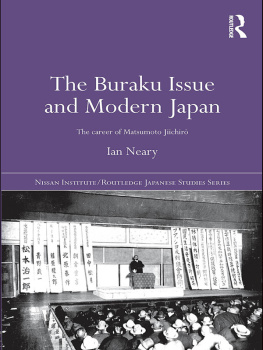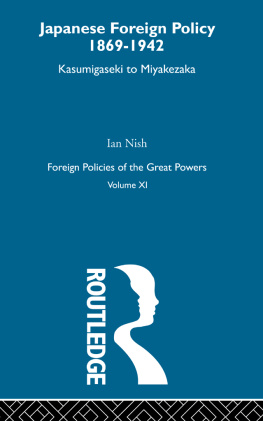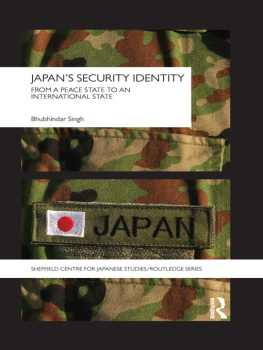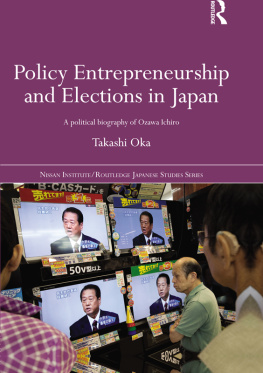Dwa Policy and Japanese Politics
This book locates the development of Dwa policy projects within their historical and political context, offering examples of human rights protection in a non-Western society.
Charting Dwa policy from its origins in the pre-war period to its revival after 1945 up to the turn of the 21st century, chapters in this study provide a social and historical review supplemented by detailed analyses of policy process and implementation at both national and local levels. No previous publication on the Buraku Problem has focused on the direct impact of Dwa policy in overcoming prejudice and economic inequalities. Topics covered range from left-wing Buraku Liberation League demands in the late 1950s, the Special Measures Law for Dwa Policy Projects (SML) in the 1960s, and the evolution of a human rights based Dwa policy into the 1970s, 1980s, and 1990s. Through its evaluation of the relative successes and failures to improve local infrastructure and opportunities for marginal communities, this book invites comparative analysis with policies in other Asian and Western polities which seek to mitigate descent-based and racial discrimination.
Dwa Policy and Japanese Politics will prove a valuable resource for students and scholars of international relations, human rights, politics, and Japanese studies.
Ian Neary is an emeritus fellow of the Nissan Institute and St Antonys College, Oxford University. He has previously published Human Rights in Japan, South Korea and Taiwan, 2002 and The Buraku Issue in Modern Japan: The Career of Matsumoto Jiichiro, 2010. The second edition of his textbook, The State and Politics in Japan, was published in 2019.
Nissan Institute/Routledge Japanese Studies
Series Editors:
Roger Goodman, Nissan Professor of Modern Japanese Studies, University of Oxford, Fellow, St Antonys College
J.A.A. Stockwin, formerly Nissan Professor of Modern Japanese Studies and former Director of the Nissan Institute of Japanese Studies, University of Oxford, Emeritus Fellow, St Antonys College
The Liberal Democratic Party of Japan
The Realities of Power
Nakakita Kji
Japans New Ruralities
Coping with Decline in the Periphery
Edited by Wolfram Manzenreiter, Ralph Ltzeler and Sebastian
Polak-Rottmann
New Directions in Japans Security
Non-U.S. Centric Evolution
Edited by Paul Midford and Wilhelm Vosse
Child Guidance Centres in Japan
Alternative Care and the Family
Michael Rivera King
Gradual Institutional Change in Japan
Kantei Leadership under the Abe Administration
Karol Zakowski
Tenk
Cultures of Political Conversion in Transwar Japan
Irena Hayter, George T. Sipos, Mark Williams
Rethinking Locality in Japan
Edited by Sonja Ganseforth and Hanno Jentzsch
Dwa Policy and Japanese Politics
Ian Neary
For more information about this series, please visit: www.routledge.com/Nissan-Institute-Routledge-Japanese-Studies/book-series/SE0022
First published 2022
by Routledge
2 Park Square, Milton Park, Abingdon, Oxon OX14 4RN
and by Routledge
605 Third Avenue, New York, NY 10158
Routledge is an imprint of the Taylor & Francis Group, an informa business
2022 Ian Neary
The right of Ian Neary to be identified as author of this work has been asserted by him in accordance with sections 77 and 78 of the Copyright, Designs and Patents Act 1988.
All rights reserved. No part of this book may be reprinted or reproduced or utilised in any form or by any electronic, mechanical, or other means, now known or hereafter invented, including photocopying and recording, or in any information storage or retrieval system, without permission in writing from the publishers.
Trademark notice: Product or corporate names may be trademarks or registered trademarks, and are used only for identification and explanation without intent to infringe.
British Library Cataloguing-in-Publication Data
A catalogue record for this book is available from the British Library
Library of Congress Cataloging-in-Publication Data
Names: Neary, Ian, author.
Title: Dwa policy and Japanese politics / Ian Neary.
Description: Milton Park, Abingdon, Oxon ; New York, NY : Routledge, an imprint of the Taylor & Francis Group, an Informa Business, 2021. |
Series: Nissan Institute/Routledge Japanese studies series | Includes bibliographical references and index. |
Subjects: LCSH: Civil rightsJapan. | Human rightsPolitical aspectsJapan. | MinoritiesLegal status, laws, etc.Japan. | DiscriminationLaw and legislationJapan. | Buraku peopleCivil rights. | Buraku peopleJapanHistory.
Classification: LCC KNX2460 .N43 2021 | DDC 323.0952dc23
LC record available at https://lccn.loc.gov/2021009862
ISBN: 978-0-367-65134-3 (hbk)
ISBN: 978-0-367-65136-7 (pbk)
ISBN: 978-1-003-12799-4 (ebk)
DOI: 10.4324/9781003127994
Typeset in Times New Roman
by codeMantra
For Joseph and Abigail: always in my thoughts
DOI: 10.4324/9781003127994-1
Owing to discrimination which was formed based on social status in the course of the historical development of Japanese society, some Japanese people have been forced to endure a lower status economically, socially and culturally, and they are still subject to various kinds of discrimination in their daily lives even today. This is the Dwa issue, which is a unique Japanese human rights problem.
the State, together with local public entities, has been working since 1969 on measures for regional improvements in order to improve the impoverished environment of the Dwa districts and the regional disparity has become considerably smaller.
However, discrimination in marriage and employment has not ended.
Ministry of Justice website 2015 (since deleted)
After being mostly overlooked by overseas scholarship, more has been written recently in English about the Buraku Problem. Since 2000, some 15 academic monographs focusing exclusively or partially on Buraku issues have been published in the USA or the UK. However, most of them deal with historical topics; only three consider Buraku issues in the context of post-war Japan. A search of publications in academic journals reveals a slightly wider variety of articles that seek to explain the persistence of the Buraku issue in the context of contemporary Japan but none explore the origins or impact of the Dwa policy that the state launched in 1969 to address, even solve, the Buraku Problem.
There are of course many policy areas that have for whatever reason received scant attention in the English language literature. Japan is a large and complex political economy and the number of non-Japanese scholars working on it is relatively small and usually focused on topics relevant to their polities. Even in such circumstances one might expect to find more research published in Japanese about the Dwa policy which had not, yet, been examined by overseas researchers. Now there was a time when this was true. As I will discuss in a little more detail later in this chapter, during the 1980s, there was a wave of interest in Dwa policy that led to a series of publications about what had been done, what remained to be done, and how effective it had been. Entering the 1990s, however, as the implementation of Dwa policy drew to a close, that interest quickly evaporated. Most of what has been published on the topic since then has taken the form of compilations of government documents reproducing the legislation, regulations, and budgets of the Dwa Projects Policy. But this did not stimulate researchers either in Japan or outside it to enquire what had been done or to assess what had been achieved. Exactly why this is at a time when there has been an increase in academic research about Japan is an interesting topic but not one that will be addressed here.











